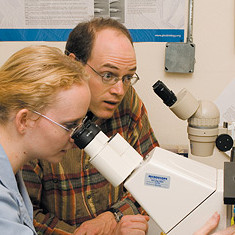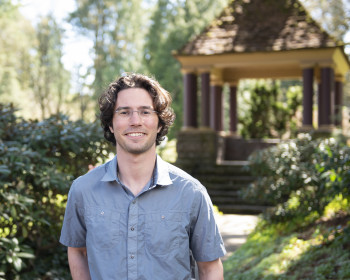National Science Foundation Invests (Again) in “Wormland”
Biology professor Greg Hermann has been awarded a nearly half-million dollar grant from the National Science Foundation, his third NSF grant since joining Lewis & Clark. His three-year project on the development of lysosome-related organelles in nematodes will engage between 25 and 55 undergraduates each year in mentored, investigative, and original research.
Open gallery

Only at a liberal arts college would the description for a scientific research project begin with a quote from Nietzsche: “You have made your way from worm to man, and much within you is still worm.” But that’s exactly what appears on the homepage of Professor of Biology Greg Hermann’s website, which details his current research and offers a glimpse into his teaching philosophy.
Hermann is devoted to the idea that his students should become critical thinkers, well-versed in data evaluation and ready to question established beliefs in every field, not just science. That’s why he draws on all the aspects of a liberal arts education in his teaching and research, from genome sequencing to German philosophers.
And, of course, lots of worms.
Hermann’s research, known by many as “Wormland,” has earned him a grant from the National Science Foundation. Supported by the NSF’s Division of Molecular and Cellular Biology and the Research in Undergraduate Institutions program, the three-year project will engage between 25 and 55 Lewis & Clark undergraduates each year in mentored, investigative, and original research.
“By studying the worm,” explained Hermann in an interview with the Chronicle, “we can learn almost everything about how a multicellular animal is made and how it works.”
Formally titled Investigating the Mechanisms Regulating the Formation of Lysosome-Related Organelles, Hermann’s research focuses on an LRO in one species of nematode, Caenorhabditis elegans, and the cells instrumental to its development. Working with student researchers, Hermann hopes to discover how animal cells develop organelles to serve a particular function and identify factors that promote the formation of LROs.
Hermann’s focus on mentoring and developing students into science researchers is central to his approach to teaching. In 2012, the Council on Undergraduate Research awarded him the Outstanding Mentor Award in Biology. This new award is also Hermann’s third NSF grant since joining Lewis & Clark. It follows two grants he received in 2009 and 2011, both of which furthered student research and participation in the natural sciences.
More Newsroom Stories
Public Relations is located in McAfee on the Undergraduate Campus.
MSC: 19
email public@lclark.edu
voice 503-768-7970
Public Relations
Lewis & Clark
615 S. Palatine Hill Road MSC 19
Portland OR 97219

